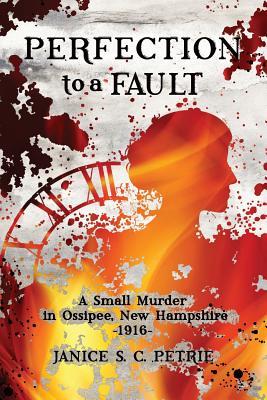Voted "Best in New Hampshire" by New Hampshire Magazine and was a featured segment on WCVB-TV Boston's Chronicle.
"Petrie expertly puts details into historical context and annotates each chapter with newspaper and court documentation. Written in 2000 but even more intriguing as the 100th anniversary of the crime approaches, this thorough account will appeal to fans of true crime."- Publisher's Weekly
"Petrie vividly re-creates the circumstances and aftermath of an early 20th-century murder in this true-crime book. Exhaustive detail and flawless re-creations make for real suspense in this nonfiction tale." - Kirkus Reviews
This second printing of "Perfection To A Fault" is the exact same story that was so favorably reviewed by Publisher's Weekly and Kirkus Reviews, among others. A new cover design and a much requested Photo Gallery were added, as the 100th anniversary of the story approaches. This book is the non-fiction account of the events which encompassed a murder and trial at the turn of the century in Ossipee, New Hampshire. When Florence Small's smoldering body rose to the surface of the basement water, local folks immediately suspected her husband of the crime. Frederick Small was an outsider, a Boston man, who had moved to Ossipee Lake to semi-retire. There was a deep distrust of "city fellas up there behind the Ossipees," in 1916 and perhaps this suspicion was warranted. But how could Frederick have been responsible for a murder and a fire that happened 7 hours after he had left for Boston on a business trip? The sensational trial that followed was unlike any previously experienced in Carroll County. And although everybody from the Boston area to Portland, Maine, had an opinion, nobody anticipated the decision the jury would reach. The unrest on the ill-fated property remained even in 1956, when Anna Foley's unsuspecting son and daughter-in-law felt the effects of the events of 1916 one August night while vacationing on the property.
The Manchester Leader and Evening Union newspaper wrote in anticipation of a verdict, "If the state has proved its case, it has developed a new type of New Hampshire criminal. It has brought forth a cool, daring, mechanical and chemical genius, a man who scorned the ordinary forms of murder but who brought forth to the mountains of this quiet village a science which would baffle a Craig Kennedy or Sherlock Holmes. The jury of his peers will decide whether Frederick L. Small is that man or the normal individual who has been made a victim of circumstances and is being tried for a crime which he never committed and of which he had no knowledge."
